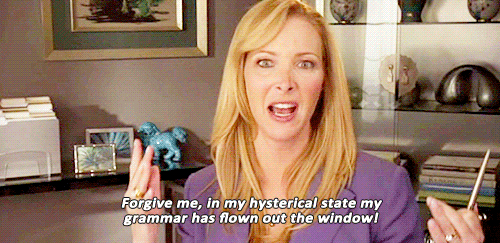
Life

Share
4th December 2015
12:38pm GMT

 Now a group of teachers have come together to list the seven most common grammar mistakes they view in essays, CVs and everyday social media.
Complied by The Independent, here are the seven worst offenders for incorrect use of grammar.
How many are you guilty of?
1 Your vs You’re
Your – A possessive adjective
You’re – Contraction of ‘You are’
2 Than vs Then
Than – Used to make a comparison
Then – An adverb used mainly to refer to the timing of a situation or event
3 Effect vs Affect
Affect – An action that will cause a change or make a difference, to ‘have an affect’
Effect – The change itself, that comes as a result of an action, the after feeling of a change of difference
Now a group of teachers have come together to list the seven most common grammar mistakes they view in essays, CVs and everyday social media.
Complied by The Independent, here are the seven worst offenders for incorrect use of grammar.
How many are you guilty of?
1 Your vs You’re
Your – A possessive adjective
You’re – Contraction of ‘You are’
2 Than vs Then
Than – Used to make a comparison
Then – An adverb used mainly to refer to the timing of a situation or event
3 Effect vs Affect
Affect – An action that will cause a change or make a difference, to ‘have an affect’
Effect – The change itself, that comes as a result of an action, the after feeling of a change of difference
 4 A lot and As well
These two phrases are both separate words – don’t forget to put in the space.
5 i.e. – vs - eg
i.e. comes from the Latin id est, meaning ‘that is’. In short terms, it’s used as a way of explaining an issue, or to state something in different words
e.g comes from the Latin exempli gratia, meaning ‘for the sake of example’. Used to illustrate an example of a point
6 Semi-colon – vs – comma
Comma - Use a comma after the first independent clause (the first part of a sentence that can stand independently on its own), and when you link two independent clauses with one of the following coordinating conjunctions: and, but, for, or, nor, so, yet.
Semicolon - Use a semicolon when you link two independent clauses with no connecting words.
7 Anxious
This word is quite commonly used with the wrong meaning.
4 A lot and As well
These two phrases are both separate words – don’t forget to put in the space.
5 i.e. – vs - eg
i.e. comes from the Latin id est, meaning ‘that is’. In short terms, it’s used as a way of explaining an issue, or to state something in different words
e.g comes from the Latin exempli gratia, meaning ‘for the sake of example’. Used to illustrate an example of a point
6 Semi-colon – vs – comma
Comma - Use a comma after the first independent clause (the first part of a sentence that can stand independently on its own), and when you link two independent clauses with one of the following coordinating conjunctions: and, but, for, or, nor, so, yet.
Semicolon - Use a semicolon when you link two independent clauses with no connecting words.
7 Anxious
This word is quite commonly used with the wrong meaning.
 ‘Anxious’ is a negative feeling, and shouldn’t be used to convey signs of excitement. To be ‘anxiously awaiting news’ should only refer to a negative feeling – rather than excitement.
Lead Image: KnowYourMeme
‘Anxious’ is a negative feeling, and shouldn’t be used to convey signs of excitement. To be ‘anxiously awaiting news’ should only refer to a negative feeling – rather than excitement.
Lead Image: KnowYourMemeExplore more on these topics: